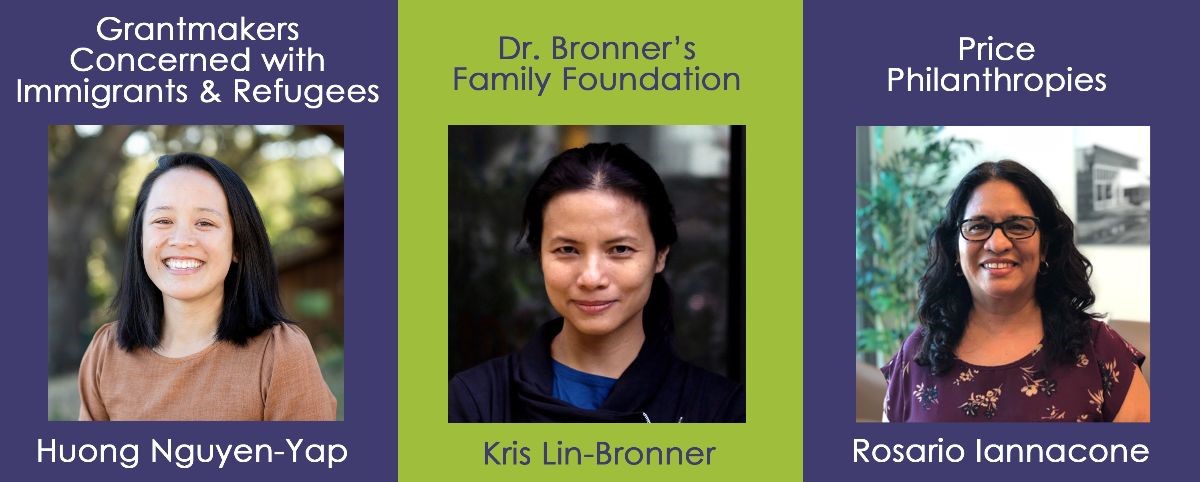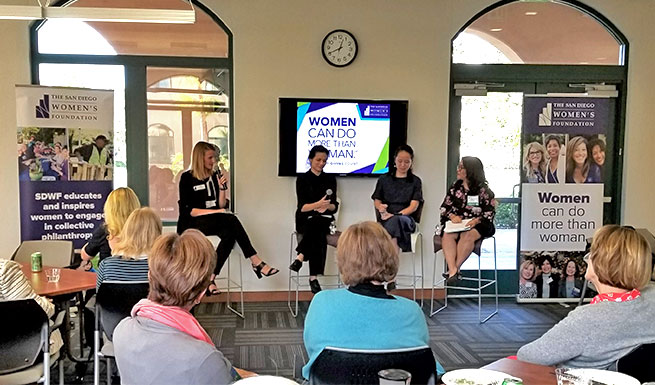Members of the San Diego Women’s Foundation (SDWF) don’t shy away from challenging, complex issues, and we embrace a culture of learning and collaboration. Both were evident at our November 2019 learning session. We hold learning sessions with each grant cycle to ensure that we – as an organization, and as individual members who support the grantmaking process – have a deeper understanding of the issues we are funding.
With our current grants cycle, we aim to support refugees, asylees and asylum seekers with basic needs and transition services. On October 30, we had a packed house for a panel discussion featuring the expertise of three fellow grantmakers working in this space.

Our panel included Kris Lin-Bronner with Dr. Bronner’s Family Foundation, Huong Nguyen-Yap with Grantmakers Concerned with Immigrants and Refugees (GCIR) and Rosario Iannacone with Price Philanthropies. Our goal for this discussion was twofold: to learn from the experience of peer organizations, and to better understand how our grant funding will fit in the broader landscape of work being done in our region.
Best Practices for Working with Refugees and Asylum Seekers
Refugees and asylum seekers face complex challenges, and there isn’t a single “right” approach. But our panelists agreed on 5 key best practices that funders and changemakers should consider adopting:
1. Center community in our work.
Trust community members as experts on their own needs, and as partners in finding solutions. Price Philanthropies has long been a model of this approach, working in close partnership with the City Heights community that it serves.
2. Balance immediate needs with longer-term solutions – and know that no one funder can do it all.
SDWF’s grants will focus on basic needs and transition services. We tend to support direct service work, and there is great need for these services. But, as is often the case, more permanent solutions will also require research and policy change. Dr. Bronner’s Family Foundation has decided to focus on these projects. As a funder or philanthropist, know that you’re not alone and decide how you can best fit as part of the bigger picture of changemakers.
3. Pay attention to language and narrative.
Words matter. When funders are working to provide opportunity to communities facing unique challenges, we should be particularly careful to ensure that our language doesn’t further stigmatize the populations that we hope to support.
4. Lead with trust and provide flexible funding.
General operating support is the most effective way to help any nonprofit accomplish their goals, and flexible funding is particularly important when needs are rapidly changing. All three panelists spoke to the importance of allowing nonprofits the flexibility to adapt to best meet community needs.
5. Help address secondary trauma.
The nonprofits that we fund are often in close, direct contact with individuals and families who have experienced difficult journeys, violence and extreme poverty. This work can be difficult and emotionally taxing. When crisis hits, staff members may work long hours with little reprieve. Funders can support nonprofit staff by funding fair wages and benefits, and GCIR recommends considering providing additional funding specifically to address the emotional burden that they carry.
Learning Sessions
With each year’s grants cycle, SDWF members commit to deep learning, so that we can make effective grant decisions. This panel was the second learning session focused on refugees, asylees and asylum seekers.
Our next learning session will be an engaging breakfast conversation with UC San Diego’s Dr. Tom Wong on Wednesday, February 19, during which we will unpack his recent research into the experiences of asylum seekers in San Diego County. Contact me if you’d like more information about this session or about how to join with us in philanthropy as a member of SDWF.




